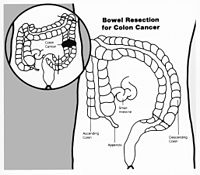
Photo from wikipedia
0.27 to 2.59], and positive distal resection margin (DRM) (RD 0.15%, 90% CI 0.58 to 0.87). The authors used RD as absolute measure for CRM, PME, DRM, and other dichotomous… Click to show full abstract
0.27 to 2.59], and positive distal resection margin (DRM) (RD 0.15%, 90% CI 0.58 to 0.87). The authors used RD as absolute measure for CRM, PME, DRM, and other dichotomous outcomes. According to Cochrane handbook for systematic reviews, the clinical importance of an RD may be affected by risk of events; a RD of 2% may represent a small clinically insignificant change from a risk of 58% to 60%, but a proportionally much larger and potentially important change from 1% to 3%. Relative effect measures (relative risk [RR] and odds ratio) are more consistent than absolute measures (RD and number needed to treat). For this reason, Cochrane handbook suggests to avoid performing meta-analyses of RD unless there is a clear reason. The authors included RCTs for this meta-analysis, so we think RR is suitable for these dichotomous outcomes. Second, only 14 unique studies with 2347 patients in the laparoscopic resection group and 1887 in the open resection group were included in the meta-analysis. We also found the results of CRM, PME, and DRM in open resection group were all better than those in the laparoscopic resection group, although no statistically significant differences. We wondered whether these noninferior results are caused by the small size of the sample. Whether the sample size of meta-analysis was enough, trial sequential analysis (TSA) is an important method. For example, we conducted a TSA for the outcome of DRM. We assumed a positive DRM rate of 0.81% in the laparoscopic resection group and 0.69% in the open resection group (average positive DRM rate in the two groups of the included studies), an alpha of 5%, and a beta of 20%. After calculation, we found at least 11,341 patients would be required, whereas 4234 patients were included in this meta-analysis. Furthermore, the cumulative Z-curve failed to cross the monitoring boundary, and fell way short of the required information size, indicating that further studies were still needed for the DRM outcome. Third, the authors only compared surgical resection outcomes (such as CRM, PME, and DRM) between laparoscopic resection group and open resection group. But we think the most important and primary endpoint should be long-term survival. The authors only assessed surgical resection outcomes, but not long-term prognosis outcomes. As we know, some studies have investigated the long-term prognosis outcomes for laparoscopic versus open resection for rectal cancer. In the ACOSOG Z6051 RCT, Fleshman et al found laparoscopicassisted resection of rectal cancer was not significantly different to OPEN resection of rectal cancer based on the outcomes of DSF. In the ALaCaRT RCT, Stevenson et al reported laparoscopic surgery for rectal cancer did not differ significantly from open surgery in effects on DFS and OS. In the NTCLES study, Li et al found laparoscopic and open surgery for middle and lower rectal cancer offers similar long-term outcomes. Baik et al also reported the 5-year overall and disease-free survival rate also were similar in the 2 groups. It seems another meta-analysis assessing long-term prognosis outcomes is required for this topic. In summary, the authors found laparoscopy was noninferior to open surgery for rectal cancer in terms of individual quality of surgical resection outcomes. We agree that laparoscopic resection is important alternative method for rectal cancer, but when it was suggested as a routine use, we think more evidence are needed.
Journal Title: Annals of Surgery
Year Published: 2019
Link to full text (if available)
Share on Social Media: Sign Up to like & get
recommendations!